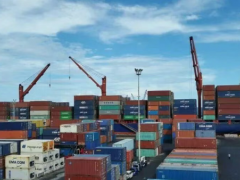Beautiful Uganda, September 25, 2024- According to World Bank data, agriculture in Uganda contributes 25% of the country's gross domestic product and provides livelihoods for 70% of the population. In recent years, the Ugandan government has identified the development of organic agriculture as a key to achieving self-reliance and the goals of the Poverty Alleviation Action Plan. To this end, the country has formulated relevant strategies and policies to support the development of organic agriculture, continuously improving agricultural productivity and agricultural added value. The reporter recently visited Uganda to gain an on-site understanding of the local development of organic agriculture and the achievements of agricultural cooperation between China and Uganda.
Characteristic agriculture unleashes development potential In the suburbs of Jinja City in eastern Uganda, Kannis, who is nearly fifty years old, is harvesting bananas. This year, the crops planted in Kannis have yielded well, and he has always had a smile on his face. Kanis is one of the earliest farmers in Uganda to engage in organic agriculture production. In the past, we used fertilizers to maintain soil fertility and chemical pesticides to control pests and diseases, but this had a negative impact on the environment. Later, the government sent technicians to promote organic planting in the village, and I became interested in this planting method. "Kannis told reporters that after registering for an organic agriculture training course, he began to turn to organic agriculture production and his income was much higher than before. Uganda has a mild climate and abundant rainfall, with over 80% of its land being high-quality arable land and unique agricultural resources. The Uganda government has identified agriculture as a key development area in both its 5-year national development plan and the 2040 long-term plan. The reporter learned during the interview that in order to improve agricultural productivity, the Ugandan agricultural department has designated different crop planting areas based on the soil and climate conditions in different regions. For example, the eastern region of the country is the largest producer of cassava, sweet potatoes, corn, rice, and millet, the western region is the main production area of rice bananas and beans, and the northern region is the main production area of peanuts, sorghum, sesame, etc. Ugandan agricultural officials stated that the government has provided detailed planting guidelines to enable farmers to choose crop types according to local conditions and increase yields. The Ugandan government attaches great importance to the development of organic agriculture and plans to make it a business card in the agricultural sector. The global consumption of organic products continues to grow rapidly, providing opportunities for Uganda to develop into an important global supplier of organic products. The government has formulated policies to promote the development of organic agriculture, driving investment in the entire organic agriculture value chain and bringing huge benefits to Uganda's economy, society, environment, and other aspects. Agricultural technology fills the gap in development In recent years, the Ugandan government has placed greater emphasis on the application of agricultural technology to address the shortcomings of weak agricultural infrastructure. The agricultural information service application platform created by the Ugandan enterprise "Uganda Light Capital Finance" brings together more than 50 agricultural experts to provide farmers with technology and knowledge related to increasing production and income, as well as industrial management. Farmers can not only learn about soil conditions, food supply and other information through this platform, but also conveniently provide financial services, "said the company leader. Since its launch in 2019, the platform has benefited more than 20000 farmers. New equipment such as drones also provide assistance in improving agricultural productivity. During the interview, the reporter saw that some farmers were able to proficiently use drones for field management with the help of technical personnel. Kannis said, "The use of new technologies and equipment allows us to have more energy to manage more land, improve production efficiency, and increase income To encourage farmers to actively adopt organic agriculture technology, the Ugandan government has introduced a series of policies and measures to develop organic agriculture, providing comprehensive support in terms of funding, technology, and market channels. As early as 2004, Uganda formulated an organic agriculture policy and passed the Uganda Organic Product Standards. In February of this year, Uganda also released standards and usage guidelines for organic fertilizers, specifying relevant sampling and testing methods to ensure accurate testing of organic fertilizers on the market and promote the production and application of high-quality organic fertilizers. Currently, organic agriculture in Uganda has achieved phased results. The organic agricultural products produced in the country, such as pineapples, apples, bananas, mangoes, papayas, sweet potatoes, etc., are popular in the international market. The annual export value of organic agricultural products exceeds 300 million US dollars, accounting for about 20% of the country's agricultural export value. China Ukraine cooperation promotes agricultural transformation Standing in the bountiful rice fields, 45 year old Robert was filled with joy. I have been growing rice for over 20 years and have never seen such high yields. I believe in Chinese hybrid rice and the agricultural technology experts sent by China, "Robert told reporters. Chinese agricultural technology experts taught him how to grow rice step by step and tried using organic planting methods. Nowadays, Robert has grown from an ordinary farmer to a local expert in hybrid rice cultivation. The third phase of the South South cooperation project jointly launched by the Chinese government, the Food and Agriculture Organization of the United Nations, and the Ugandan government is currently being implemented. about 60 Chinese agricultural experts and technicians have come to Uganda to help develop agriculture locally. Zhang Xiaoqiang, the leader of the Chinese agricultural expert group, told reporters that organic agriculture is an important part of the agricultural cooperation with Uganda. On the one hand, by introducing and testing new water-saving and drought resistant hybrid rice varieties from China, we can balance high yield and disease resistance, and reduce pesticide application; On the other hand, promoting China's rice paddy fish farming technology and rice fish symbiosis not only ensures the efficient utilization of agricultural resources but also promotes the organic development of product ecology. In 2022, the South South Cooperation Project established the South South Cooperation Agricultural Technology Innovation Center. The center collaborates in the three major fields of rice, aquaculture, and animal husbandry, establishing high-yield rice demonstration zones, aquatic value chain research and development centers, and a sustainable circular system for upgrading the animal husbandry industry, effectively improving local food security and agricultural security capabilities, and promoting local agricultural green transformation and development. Through the platform of South South cooperation projects, China provides various types of training for local agricultural officials, technicians, and farmers, imparting practical technologies and management experience including organic agriculture and ecological agriculture, and cultivating a large number of modern agricultural talents for Uganda. With the help of Chinese agricultural experts, we are achieving a strategic shift from self-sufficient agriculture to commercial agriculture, "said Dr. Bright, Minister of Livestock at the Ugandan Ministry of Agriculture, Animal Husbandry and Fisheries








